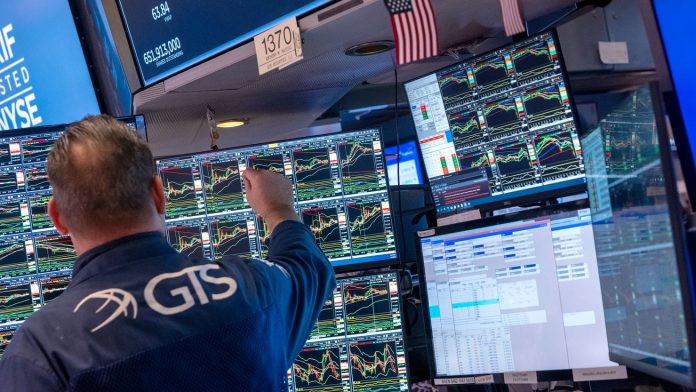The US is imposing 104% tariffs on China because the country has not withdrawn retaliatory measures to US tariffs of 34%, Fox Business reporter Edward Lawrence said on X.
“A White House spokesman said the additional 104% tariffs went into effect at noon Eastern time because China has not withdrawn retaliatory measures,” Lawrence wrote.
The tariffs begin on April 9 from 0:01 a.m., as in the case of other countries against which reciprocal tariffs have also been imposed.
On April 2, US President Donald Trump announced the introduction of reciprocal tariffs on goods from dozens of countries. The base rate of 10% has already begun to operate, but for some states the tariff will be higher. In particular, for China, a tariff of 34% was announced and Beijing introduced the same in response, it will begin to operate from April 10.
Then, the American president threatened that he would raise the tariff for China by another 50% – in addition to the promised 34% and 20% imposed in March because of allegations that the drug fentanyl was coming from China to the US. Beijing then imposed tariffs of 10 and 15 per cent on certain groups of goods, rather than on all imports as the US did.
In response to Trump’s threat, China’s Ministry of Commerce said the country would never accept the imposition of additional tariffs. “If the US insists on its own way, China will fight to the end,” the ministry said.
Amid the trade conflict, the Shanghai Composite index fell 7.34 per cent for the day. China said it would not tolerate tariff “blackmail” from Washington.
Voice from Europe
Former Greek finance minister Yanis Varoufakis wrote on X:
“To those worried about the share markets’ collapse and their impact on trade, and who wonder how Europe should respond, here are my thoughts this morning:
How will the fall in share prices affect the global economy? Share prices have little to do with actual trade. Their precipitous fall reflects more the terror of margin calls on traders (who used overpriced shares to borrow for the purposes of gambling) than the real effects on trade. If falling shares become self-perpetuating, they may, of course, bring about the loss of confidence that cripples investment and slows down production. My view is that the negative effects will be real but nothing as dramatic as the recent falls in share prices might suggest. It is also important to keep in mind that Trump’s shotgun has two barrels. One barrel fired indiscriminate tariffs. The second will, at some point, fire exorbitant tax cuts for fat cats. When it does, I won’t be surprised if the fickle share markets go through the roof again in a spectacular show of mass relief.
Will Trump’s tariffs stop global trade functioning as it should? This question is founded on an error: that trade was functioning as it should before Trump whacked it on 2nd April. It wasn’t! Since 1971 we lived in a grossly imbalanced system that relied, for its stability, of an unsustainably expanding American trade and gvt budget deficit. That Trump’s Shock may have been rude, uncouth, indeed shocking and wrong-headed means neither that things were fine before 2nd April nor that Trump’s way of upending a problematic status quo was the right way to do it.
How should Europe respond? The early bravado from Brussels was inane and self-harming. When you are running a $240 billion surplus with America annually, you cannot win a trade war. Full stop. The only thing you can and you MUST do is blow up your own mercantilist model before you stagnate into irrelevance. Europe must rebalance its own economy so that it stops relying on ridiculous surpluses that go hand in hand with low investment and low demand domestically. For that Europe needs an additional domestic investment of at least 700 billion euros annually – something that, however, requires Europe to do the one thing Berlin steadfastly refused to do when it was politically possible with the result that it is now no longer politically possible: a fiscal and a political union.”
Italian journalist and activist Maurizio Belpietro also noted:
“Retaliatory measures will backfire and feed us to Beijing. Take India as an example, which prefers negotiations to confrontation. Moreover, our top leaders are also calling for calm.”
